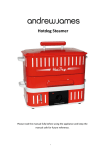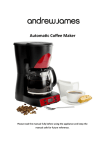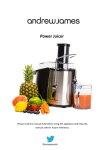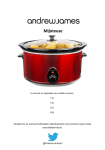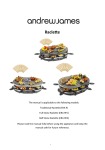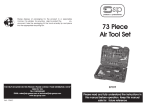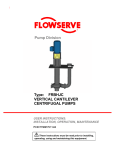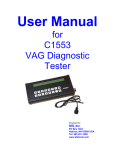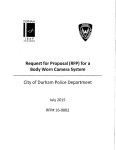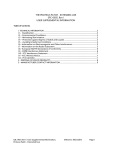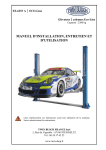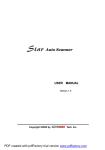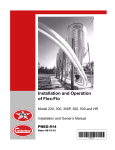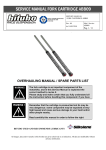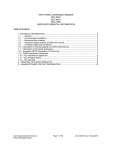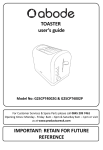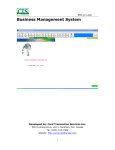Download ChlorGuard User Manual
Transcript
PSI Global Ltd – UK Office ChlorGuard Division Bowburn South Industrial Estate Bowburn Durham DH6 5AD Tel: +44 (0)191 377 0550 Fax: +44 (0)191 377 0769 E-mail: [email protected] Website: www.chlorguard.com GasDetectorsUSA.com ChlorGuard Division 4339 Stacy Ln Seabrook Texas 77586 - U.S.A. Tel +1 832-615-3588 Fax +1 704 5412894 E-mail: [email protected] Website: www.GasDetectorsUSA.com Sales Contact: Lloyd Cochrane Mob: +44 (0)7976134003 E-mail: [email protected] Sales Contact: Joe Camero ChlorGuard Drum D & ChlorGuard Cylinder C 1 Product Information 1.0 Background Information ChlorGuard is an emergency valve shutoff system used for chlorine (or other toxic/dangerous gas) drums and cylinders. This information is for the ChlorGuard D drum closure system and ChlorGuard C cylinder closure system. The D designation indicates that the system is used to close drums. The C designation indicates that the system is used to close cylinders using pneumatic sir drives. Present day requirements for storage and use of chlorine demand, safe effective means of preventing emissions to atmosphere which may cause corrosion or injury. ChlorGuard is a remote shutdown system for effecting closure of a chlorine drum or cylinder in the event of a downstream leakage. The actuation of the device may be initiated by a gas sensor within a room or enclosure housing the drum or cylinder, or it may be initiated manually by means of a switch located externally to the room or enclosure. The system provides a valve closing mechanism comprising a control panel, a number of air driven motors, a corresponding number of air filter regulator lubricator and a corresponding number of drive mechanisms to the drum or cylinder valve. Powered drum or cylinder opening is not provided by the ChlorGuard system for the following safety reasons; 1) Manual opening of a drum or cylinder is believed appropriate and safer for hazardous gases because a drum or cylinder valve can initially be opened a single turn and tested for any leaking, whereas a motor drive system would always fully open the valve. 2) Activating the ChlorGuard system will only ever close the valve and this important safety facility ensures that it is impossible for anyone to accidentally open a drum or cylinder valve using ChlorGuard. 3) It enables the system to be much simpler and hence more reliable. 2 The control panel can receive signals from gas detectors, remote shutdown buttons and key switches, any of which will close the drum or cylinder valve. Control panels can normally control up to 6 drums or cylinders. The control for each drum or cylinder can be set independently to one of three modes: a) b) c) Automatic - automatic valve closure on receipt of a signal; Manual - immediate valve closure; Isolate - pneumatically isolated and hence no valve closure. These modes changes are achieved solely pneumatically. When operating in the automatic mode, there is a 5 second delay between receiving a signal from a gas monitor and starting to close the drum valve; this is done to help prevent spurious trips and ensure that the system only operates when it should do so. 3 2.0 Controls 2.1 Status Control Lever ChlorGuard can operate in one of three modes controlled by the status control lever. The status control lever has three positions; Isolate, Automatic and Manual. Where the customer requires independent control of a number of drums or cylinders, one status control lever is provided for each valve. The purpose of these is described below. Isolated Position In this position the air supply is isolated from the ChlorGuard drive unit and hence the system cannot operate. Note that putting the status control lever into this position does not isolate the ChlorGuard unit electrically. Automatic Position In this position the Chlorguard system is armed and will close the drum/cylinder or bank of drums/cylinders when one of the following occurs: a) Gas is detected by a sensor. b) Remote shut down button is pressed c) A key switch is used to initiate drum/cylinder closure. IMPORTANT: The reset button must be pressed and LED extinguished for the ChlorGuard system to operate in the Automatic Position. Manual Position As soon as the status control lever is placed in this position the ChlorGuard system will close the corresponding drum or cylinders. This function is very useful for closing empty drums/cylinders before replacing them. 2.2 Reset Button The reset button on the ChlorGuard control panel is used to arm the system ready for operation in the automatic mode. The system can only be reset once all of the inputs have been reset and the system has completed the sequence. 4 2.3 Panel Indicators 2.3.1 LED indicator Green (Mains Power) This indicator is normally illuminated to indicate the system has mains power. This will flash once mains power is lost and the system is running from battery back up. When low battery is reached, the system flashes at a higher frequency. 2.3.2 LED indicator White (Battery Charging) This indicator is only ever illuminated to indicate the system battery back up is charging. 2.3.3 LED indicator Red (Remote Stop) This indicator is illuminated to indicate the system has been activated using a remote stop button. 2.3.4 LED indicator Amber (Low Pressure) This indicator is illuminated to indicate the system has pressure. 2.3.5 LED indicator RED (Alarm) This indicator is normally not illuminated and will light up under the three following circumstances: a) This will flash when any of the bank control switches is removed from automatic. b) When a gas has been detected c) When remote stop or key test is activated. The LED can only be extinguished by pressing the reset button 2.3.6 LED indicator Green (Valves ON) This indicator is normally illuminated to indicate the system internal solenoid valves are on. These solenoid valves will only be OFF when the system is activated to shut off the gas valves. 2.3.7 LED indicator Amber (Key Test) This indicator is illuminated to indicate the system has been activated using the key test function. 5 3.0 Principle of Operation 3.1 Automatic closure of the drums or cylinders Connect ChlorGuard to the drums/cylinders. Press the reset button on the control box and check that all of the inputs have been reset (gas detection system, remote stop buttons, key test button, bank levers to automatic). Turn the status control lever control lever on the panel to the automatic position. The corresponding bank of drums/cylinders will now be closed and the LED indicator RED (Alarm) will illuminate as soon as a leak is continuously detected for longer that 5 second time delay period by any sensor linked to the control panel. 3.2 Manually initiated closure of the drums Turn the status control lever on the panel to the manual position. The valve will be closed by ChlorGuard. Wait for the valve to fully close. Turn the status control lever on the panel to the isolated position. 3.3 Key Test Function Connect ChlorGuard to the drums/cylinders. Press the reset button on the control box and check that all of the inputs have been reset (gas detection system, remote stop buttons, key test button, bank levers to automatic). Turn the status control lever control lever on the panel to the automatic position. The corresponding bank of drums/cylinders will now be closed when the key test is initiated. This basically simulates the gas alarm circuit. 6 3.4 Remote Stop Function Connect ChlorGuard to the drums/cylinders. Press the reset button on the control box and check that all of the inputs have been reset (gas detection system, remote stop buttons, key test button, bank levers to automatic). Turn the status control lever control lever on the panel to the automatic position. The corresponding bank of drums/cylinders will now be closed immediately without any delay when a remote stop button is initiated. 7 4.0 ChlorGuard Closure System 4.1 Air Supply for Closure For the integrity of the closure system a dedicated Air Receiver should be installed. This is to ensure a stored volume of air is always available for the system to operate. Two options are available and we recommend that the safety aspect be carefully considered before deciding which to use. 4.1.1 Option 1 - Air Receiver/Compressor Assembly The assembly is sized for each site application and ensures an independent stored air supply is available. Compressor can be supplied in 110V, 240V or 3 phase supply versions. 4.1.2 Option 2 - Air receiver assembly When a site has its own air supply a suitable sized air receiver can be used with the inlet fitted with a non return valve. The closure system requires an air supply of up to 8.5 bar. It should be noted however if site air is lost, the stored volume of air will only be sufficient for two closures of the valves under automatic operation. This achieved by setting the motor run time for 20-25s. If the site air supply cannot be restored the remaining volume of air after the above closures would be insufficient for the system to operate. 4.2 Control Panel The pneumatic section consists of 2-6 (1 valve per air motor) solenoid valves with the inlet side connected directly to the pressurised air receiver. Each valve outlet is connected to an outlet bulkhead where the compressed air will be taken to drive a pneumatic air drive assembly which will in turn shut off a gas drum/cylinder valve. The solenoid valves are activated by gas detection alarm, remote stop, key test or bank manual switch. 4.2.1 Fail-Safe Control Panel Solenoid valves are normally open and held closed electrically. In the event of a mains power failure the solenoid valves will open and the closure system will operate. 4.2.2 Fail-Safe Control Panel with battery back up As fail-safe control - but the battery back up will hold the solenoid closed, until a gas detection alarm, remote stop signal, key test or bank manual switch activates the electrical control section. 8 The battery back up is effective for up to 8 hours depending on the number of solenoids fitted. If mains power is not re-established the shut off closure system will operate after the above time period. 9 5.0 Specifications 5.1 ChlorGuard Control Panel DIMENSIONS mm (H x W x D) 500 x 400 x 200 CONSTRUCTION - Plastic Single compartment panel PROTECTION - Nema 4X FINISH - Standard finish with front panel label POWER SUPPLY - 110v or 230v. CONTROL ELECTRICAL - PLC Control. Signal from gas detectors. Signal from remote shut off button. Signal from key test switch. Signal from bank manual switch. SIGNAL VISUAL - Power on, battery charging, remote stop, pressure switch, alarm, valves on, key test. SIGNAL TELEMETRY - Power on, battery charging, low battery, remote stop, pressure switch, alarm, valves on, key test. SOLENOID VALVES - 24Vdc. BATTERY - 24Vdc or 10.0 Ah. 10 5.2 ChlorGuard Air Service Set DESCRIPTION - Filter, Regulator & Lubricator assembly complete with gauge – aluminium body. INLET & OUTLET - ¼ “BSP PRESSURE RANGE - 0 – 8 bar LUBRICATOR CAPACITY - 0.025 litres LUBRICATION - Silkolene VG 22 Air Line oil or equivalent. GAUGE SIZE - 50 diameter x 1/8 “ BSP bottom entry. GAUGE RANGE - 0 – 100 psi (0 – 7.0 bar). MOUNTING - Mounting brackets provided 5.3 Typical Compressor & Receiver Assembly COMPRESSOR TYPE Reciprocating compressor Electric Simplex CAPACITY 16.8 cfm displacement 12.4 cfm 100 psi MOTOR SIZE - 3.5HP CONTROL - Start – stop pressure switch control. POWER SUPPLY - 230V, single phase, 60Hz. RECEIVER CAPACITY - 270 litres / 60 Gallon vertical receiver. FITTED WITH - Gauge. ASME Safety valve. Tank drain and discharge Valve Pressure switch starter. MANUFACTURING SPEC - ASME 11 5.4 Remote Stop Button DIMENSIONS (L X W X H) - 70 x 70 x 100 FIXING - 2 holes slotted 4.3 diameter x 54 crs. COLOUR - Black (body), Yellow (cover), Black (button) CONSTRUCTION - Plastic PROTECTION - IP 65 OPERATION - Push button – Lock, twist release. 5.5 ChlorGuard C Air drive DESCRIPTION - Air motors DIMENSIONS - 231 0/A x 41.5 BODY CONSTRUCTION - Aluminium motor body, drive/mountings 304SS WEIGHT - 1.5 kg FINISH - Pre-treatment and degreasing primer. Finish coat yellow RAL 1021. OUTPUT SHAFT - 14mm diameter shaft & key. DRIVE - Adaptor to match cylinder key. OUTPUT SPEED - 160 rpm maximum. TORQUE - Up to 68Nm with high torque unit. EXHAUST SILENCER - Silences air being expelled from the Air motor and prevents misting or lubricating oil in the air. MOUNTING BRACKET - Designed to suit particular cylinder/drum valve. 12 6.0 Testimonials “ChlorGuard is a flexible and cost-effective control measure that provides peace of mind for the end user in a 24/7 business. It also provides a very necessary level of control between the operational needs of the water provider and consumer needs” Anthony Waite MANE Consultancy Consultant to South West Water “As legislative pressures increase on toxic and other gas users, ChlorGuard offers a very flexible safeguard to prevent leaks and increase site safety” Chris Dolman Product Manager Gases, BOC 7.0 Features & Benefits • • • • • • • • • • • • • Protects personnel from toxic gases. User friendly equipment. H&S compliance for all end users of toxic gases. Low running & maintenance costs. Access to world-class customer support. Adaptable & compatible system. Advanced safety & diagnostic features. Gas leak triggers immediate secure shutdown. Designed for drum and cylinder systems. Safe operation by compressed air. Telemetry feedback. Remote, rapid shutdown. Patented design. 13 Advantages over electric drive systems: • • • • • • • • • • Simple and cost effective to maintain with only mechanical parts at the motor. Less can go wrong with pneumatic drives. No danger of overheating when the motor stalls out. Pneumatic drives are generally more robust and reliable with systems in the field nearly 20 years old. Compressed air is always stored to run the motors in the event of mains power/battery drain. Don’t have to rely on electrics which can malfunction to operate electric motor as battery drains. Control panel does not have to be installed in gas room as with electric drives due to voltage drop across cables. Competitive pricing. Installed into thousands of applications worldwide for complete product confidence. Vast range of safety diagnostics for the end user. 14














